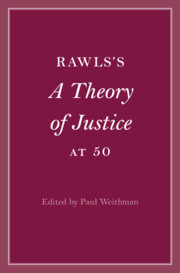Book contents
- Rawls’s A Theory of Justice at 50
- Cambridge Philosophical Anniversaries
- Rawls’s A Theory of Justice at 50
- Copyright page
- Dedication
- Contents
- Figures
- Contributors
- Acknowledgments
- Abbreviations of and Bibliographic Information for Rawls’s Works
- Introduction
- Part I Rawls and History
- Part II Developments between A Theory of Justice and Political Liberalism
- Part III Rawls, Ideal Theory, and the Persistence of Injustice
- 10 The Circumstances of Justice
- 11 Why Rawls’s Ideal Theory Leaves the Well-Ordered Society Vulnerable to Structural Oppression
- 12 Race, Reparations, and Justice as Fairness
- 13 On the Role of the Original Position in Rawls’s Theory
- Part IV Pluralism, Democracy, and the Future of Justice as Fairness
- References
- Index
13 - On the Role of the Original Position in Rawls’s Theory
Reassessing the “Idealization” and “Fact-sensitivity” Critiques
from Part III - Rawls, Ideal Theory, and the Persistence of Injustice
Published online by Cambridge University Press: 20 July 2023
- Rawls’s A Theory of Justice at 50
- Cambridge Philosophical Anniversaries
- Rawls’s A Theory of Justice at 50
- Copyright page
- Dedication
- Contents
- Figures
- Contributors
- Acknowledgments
- Abbreviations of and Bibliographic Information for Rawls’s Works
- Introduction
- Part I Rawls and History
- Part II Developments between A Theory of Justice and Political Liberalism
- Part III Rawls, Ideal Theory, and the Persistence of Injustice
- 10 The Circumstances of Justice
- 11 Why Rawls’s Ideal Theory Leaves the Well-Ordered Society Vulnerable to Structural Oppression
- 12 Race, Reparations, and Justice as Fairness
- 13 On the Role of the Original Position in Rawls’s Theory
- Part IV Pluralism, Democracy, and the Future of Justice as Fairness
- References
- Index
Summary
This chapter offers a reassessment of two familiar lines of criticism against Rawls’s Original Position (OP): the idealization critique and the fact-sensitivity critique. The former holds that the OP is too detached from the real world to deliver the right principles for us. The latter holds that the OP concedes too much to empirical reality for the resulting principles to tell us what “true justice” requires. I argue that we can blunt the force of these critiques once we fully appreciate the role that the OP plays in Rawls’s work. I distinguish between (i) Rawls’s theory, (ii) the arguments offered in support of it, and (iii) the desiderata applying to that theory, given its function. I then show that the idealization critique partly misfires, since the idealizations Rawls appeals to operate at the level of the argument offered in support of his theory, not at the level of the theory itself. Similarly, we can see that the fact-sensitivity critique does little damage to Rawls’s theory, once the theory’s function, hence the desiderata applying to it, are fully appreciated.
- Type
- Chapter
- Information
- Rawls’s A Theory of Justice at 50 , pp. 220 - 236Publisher: Cambridge University PressPrint publication year: 2023



